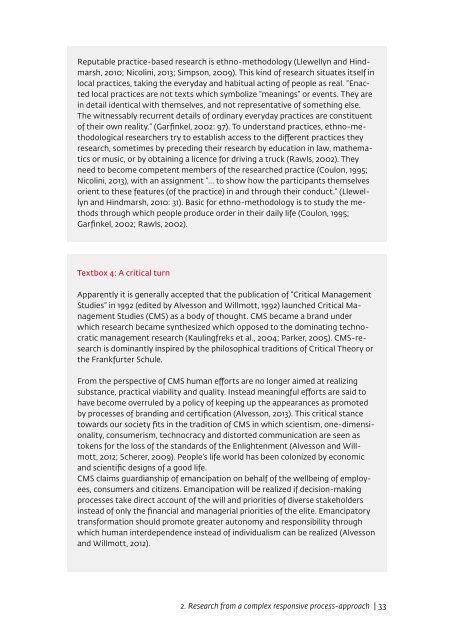Rumbling on performativity_Frits Simon
Rumbling on performativity_Frits Simon
Rumbling on performativity_Frits Simon
Create successful ePaper yourself
Turn your PDF publications into a flip-book with our unique Google optimized e-Paper software.
Reputable practice-based research is ethno-methodology (Llewellyn and Hindmarsh,<br />
2010; Nicolini, 2013; Simps<strong>on</strong>, 2009). This kind of research situates itself in<br />
local practices, taking the everyday and habitual acting of people as real. “Enacted<br />
local practices are not texts which symbolize “meanings” or events. They are<br />
in detail identical with themselves, and not representative of something else.<br />
The witnessably recurrent details of ordinary everyday practices are c<strong>on</strong>stituent<br />
of their own reality.” (Garfinkel, 2002: 97). To understand practices, ethno-methodological<br />
researchers try to establish access to the different practices they<br />
research, sometimes by preceding their research by educati<strong>on</strong> in law, mathematics<br />
or music, or by obtaining a licence for driving a truck (Rawls, 2002). They<br />
need to become competent members of the researched practice (Coul<strong>on</strong>, 1995;<br />
Nicolini, 2013), with an assignment “… to show how the participants themselves<br />
orient to these features (of the practice) in and through their c<strong>on</strong>duct.” (Llewellyn<br />
and Hindmarsh, 2010: 31). Basic for ethno-methodology is to study the methods<br />
through which people produce order in their daily life (Coul<strong>on</strong>, 1995;<br />
Garfinkel, 2002; Rawls, 2002).<br />
Textbox 4: A critical turn<br />
Apparently it is generally accepted that the publicati<strong>on</strong> of “Critical Management<br />
Studies” in 1992 (edited by Alvess<strong>on</strong> and Willmott, 1992) launched Critical Management<br />
Studies (CMS) as a body of thought. CMS became a brand under<br />
which research became synthesized which opposed to the dominating technocratic<br />
management research (Kaulingfreks et al., 2004; Parker, 2005). CMS-research<br />
is dominantly inspired by the philosophical traditi<strong>on</strong>s of Critical Theory or<br />
the Frankfurter Schule.<br />
From the perspective of CMS human efforts are no l<strong>on</strong>ger aimed at realizing<br />
substance, practical viability and quality. Instead meaningful efforts are said to<br />
have become overruled by a policy of keeping up the appearances as promoted<br />
by processes of branding and certificati<strong>on</strong> (Alvess<strong>on</strong>, 2013). This critical stance<br />
towards our society fits in the traditi<strong>on</strong> of CMS in which scientism, <strong>on</strong>e-dimensi<strong>on</strong>ality,<br />
c<strong>on</strong>sumerism, technocracy and distorted communicati<strong>on</strong> are seen as<br />
tokens for the loss of the standards of the Enlightenment (Alvess<strong>on</strong> and Willmott,<br />
2012; Scherer, 2009). People’s life world has been col<strong>on</strong>ized by ec<strong>on</strong>omic<br />
and scientific designs of a good life.<br />
CMS claims guardianship of emancipati<strong>on</strong> <strong>on</strong> behalf of the wellbeing of employees,<br />
c<strong>on</strong>sumers and citizens. Emancipati<strong>on</strong> will be realized if decisi<strong>on</strong>-making<br />
processes take direct account of the will and priorities of diverse stakeholders<br />
instead of <strong>on</strong>ly the financial and managerial priorities of the elite. Emancipatory<br />
transformati<strong>on</strong> should promote greater aut<strong>on</strong>omy and resp<strong>on</strong>sibility through<br />
which human interdependence instead of individualism can be realized (Alvess<strong>on</strong><br />
and Willmott, 2012).<br />
2. Research from a complex resp<strong>on</strong>sive process-approach | 33



